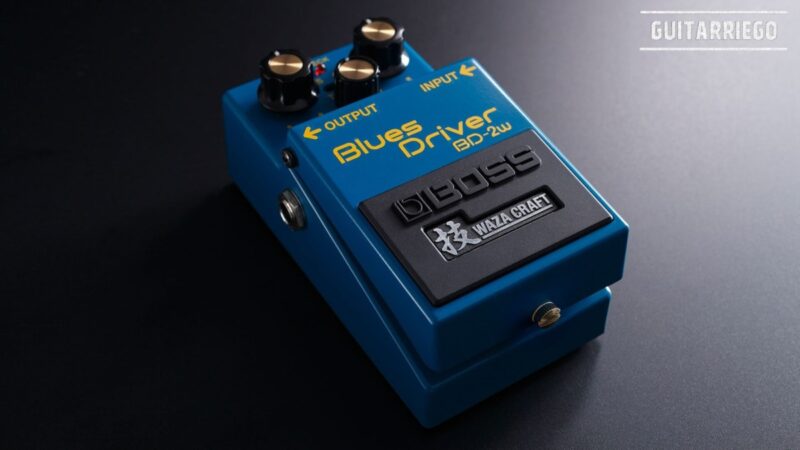Tips: How to choose the right speaker for your guitar amp
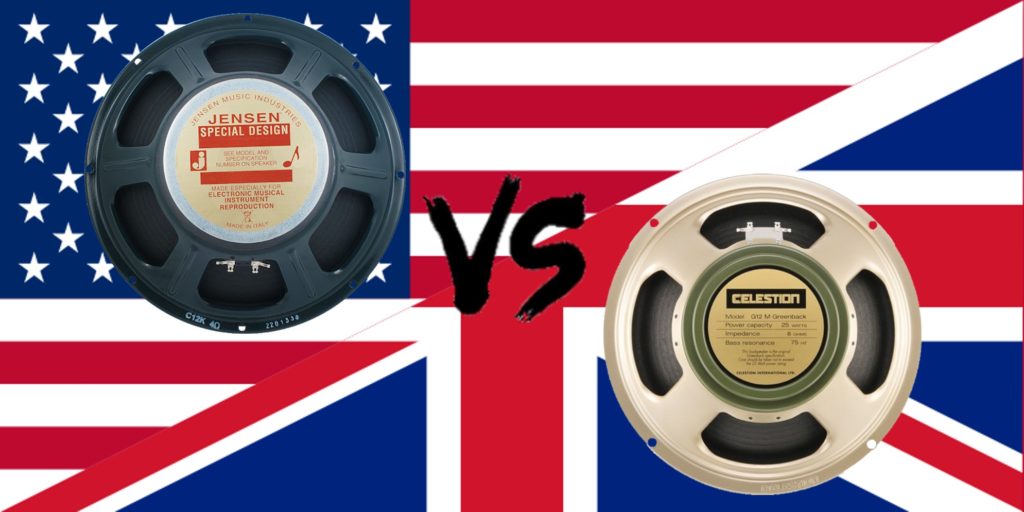
In this guide we tell you all the considerations when choosing the speaker for your guitar amp. The speaker is undoubtedly a fundamental part of your tone.
Is the speaker or speaker I use important to my tone?
The speaker is an underrated item in the weight of your tone, when it really is one of the most important parts. After your guitar and the amp, the speaker is a fundamental factor in your audio. Each speaker brand and model has a different sound and behavior that greatly influences your tone. Below, a video with an excellent example of the importance of a good speaker.
As we already saw in the guide on how to improve the tone of your amplifier, the speaker not only allows you to give a particular audio to your amplifier and your tone, it also allows you to use your amplifier differently. Thus, a more efficient or sensitive speaker will give you more volume, while one that is not so efficient will give you less volume. This can be used to make a low wattage amp perform better, or to get cleaner without the equipment starting to overdrive, or on the contrary, to achieve pure tube overdrive at lower volume (*). If you are interested in going deeper into this, check out our guide to be able to increase the volume of your amplifier.
(*) Note: for simplicity, we will use volume as a synonym for SPL.
Choosing the right guitar speaker or speaker can be a complex task when you are unfamiliar with this fascinating world. This guide aims to facilitate the selection process so that you can find what you are looking for, despite having no experience.
How to choose a guitar amplifier speaker?
The considerations you should consider when choosing a guitar speaker or speaker for your amplifier are as follows:
- Speaker or speaker audio
- Speaker sounding: British or American
- Correct speaker or speaker size
- Wattage or correct amount of watts of the speaker
- Correct speaker or speaker impedance
- Speaker or speaker efficiency and sensitivity
- and above all, use your ears
Let’s see each of the points in detail.
Things to consider when choosing a guitar speaker or speaker
We will start with the technical topics, and then we will continue with the audio related topics that require further development.

Speaker or guitar speaker sizes
Sizes are in inches, so you can find 6, 8, 10, 12 and 15-inch speakers. In small amplifiers, for example, up to 10 watts it is normal to find 6 “, 8” and 10 “speakers. With a 6 “speaker there is the Fender Champion 600 and the Vox AC4TV Mini has a 6.5” one. With an 8 “speaker is the Laney Cub 8 and with a 10” speaker are the Marshall DSL5R, the Vox AC4TV, AC4C1 and AC10 and Laney Cub 10.
In small-medium amplifiers, above 10 watts, 12-inch speakers are usually found, but there are some exceptions such as the Fender Princeton and the Superchamp that come equipped with 10 “speakers.
The standard speaker for amps above 15 watts is 12 “, which provides more bass and body than 10”. It is very common to improve the use of a larger speaker, 6 “to 8” or 10 “or 10” to 12 “. But there is a common problem with this, many cabinets do not support these improvements, so they will require a “rehousing” – a new custom cabinet – to be able to do it.
Speaker magnet size or guitar speaker
Another point to consider regarding this is the size of the magnet, which can be deeper or wider. So even if you swap a 12 “speaker for one of the same size, you may have space problems if the magnet is larger and deeper.
Celestion has a nomenclature in some of its models that usually indicates if it is for guitar with a “G”, the size of the speaker “12” or “10”, the weight of the magnet and the number of watts. So, G12H30 stands for 12 “Guitar Speaker with Heavy Magnet -Heavy- 30 watts.
Greenback is the G12M, that is, it is a speaker

The weights as references are expressed:
- H is for heavy -heavy-, although K is also for heavy magnets.
- M is for medium weight, although T is also found for medium weight magnets.
- L is for lightweight -Light-.
Always check the dimensions of the speaker that you are going to buy and make sure that your cabinet has enough size for it.
Speaker Watt or Watt Rating
Although the logical thing is that you put a speaker that supports the same amount – or a little more – of watts as the same RMS output of the amplifier, the amplifiers can have higher outputs and even peaks of higher power than nominal. Therefore, if you are going to use your amplifier at its maximum power, it would not be a bad idea to have a margin with the speakers. If you want to avoid breaking the speakers or you just don’t want them to overdrive, it is good practice to use a speaker that can handle 35% or more of the power -watts- than the rated output of the amplifier.
That said, there are people who seek and like the saturation of the speaker, especially for more vintage styles, and use speakers that support the same power rating as the amplifier gives. If the use that you will give the amplifier will not be demanding, you can buy the same nominal watts without problems.
Guitar Speaker Impedance or Ohms
It is essential that you make sure that the impedance of the speaker or speaker is equal to the impedance indicated at the amplifier output. Normally, amplifiers have several outputs with different levels of impedance or Ohms, 4, 8 or 16 ohms, but there are also equipment that does not have this option, so you should consider it.
As an example, the Fender Champ 600 has a single 4 ohm output and the Vox AC4C1 a single 16 ohm output. If your amplifier only has one output, make sure the speaker you install has the same impedance – the number of ohms.
In tube amps, using different impedances can cause the amplifier’s output transformer or speaker to break down, so never use different ohms -impedance-. Most of the speaker brands like Celestion, Eminence, WGS, Weber, etc, have 8 and 16 ohm versions for the same speaker model.
Transistorized -or solid-state- amplifiers support impedance mismatch. This means that for these equipments, using different impedances does not pose a risk of breakage, but it does affect the real power, which may result in a lower real power when using a speaker of a different impedance.
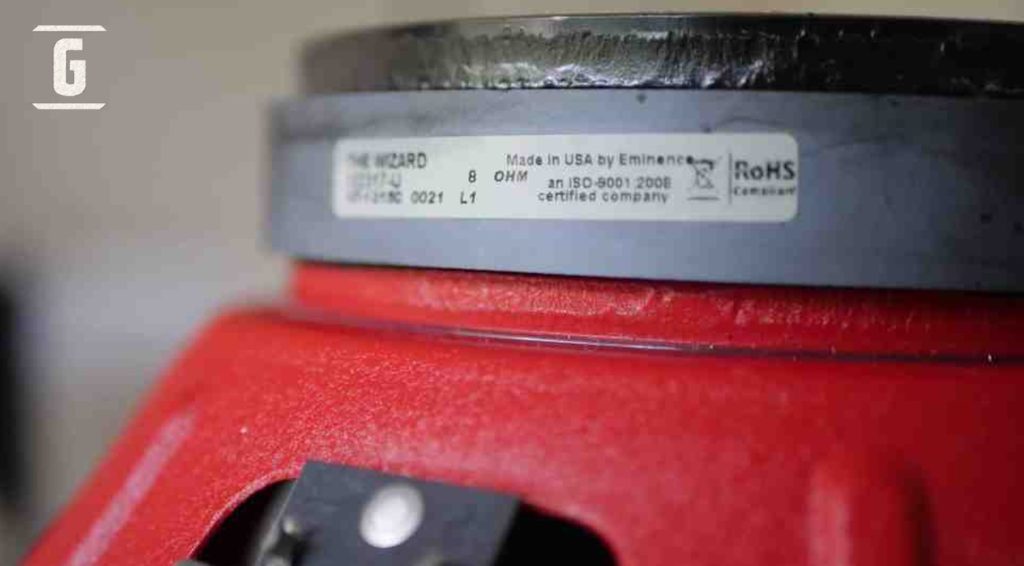
When using tube amps:
- you should never use different impedances between amplifier and speaker,
- never turn on a guitar amp without the speaker connected to the equipment,
- Never unplug a speaker while the amp is on as removing the load from the amp speaker will damage the amp head.
Types of speaker or guitar speaker audios
Each speaker has its own unique character. Some work best for clean sounds while others work best for saturated or dirty audio. There are also speakers directly associated with certain guitarists. Finally, there is a large group of audio speakers between those of American and British tone. All these references will help you choose the perfect guitar speaker or speaker for you.
Speakers or speakers with American vs British audio
Much of the difference between American amps like Fender and British amps like Vox and Marshall lies in the loudspeaker or speaker. Just as you listen to a more scooped one, that is to say with marked lows, soft mids and belling highs on a Fender, and on a Vox or a Marshall you listen to the more mid-focused audio, those audios match the character and tone of the speakers.
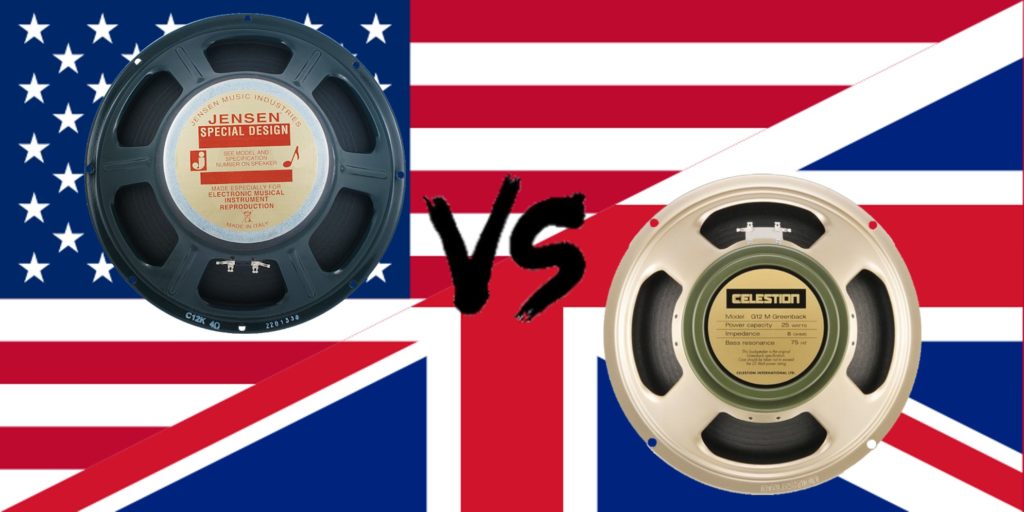
Speakers or speakers of American character or tone
This type of speaker or speaker usually has scooped audio, that is, good treble, well defined, few mids and somewhat marked bass. Thus, they are speakers with more open audio and ideal for clean tones. On the other hand, for dirty and distorted audios, they usually do not perform well, since they sound “out of focus” and tend to get a little “harsh” or high.
The best known are the Jensen, but many modern brands build this type of speaker or speaker, WGS has the American Vintage series, Eminence has the Patriot line that has American audio, and even Celestion, despite being the emblem of audio. English, it has the A-Type which is an American type speaker.
Speakers or speakers of British character or tone
Speakers with British audio have a defined character in the mids, without the extended frequencies or “open sound” of the American style. Thus, they are speakers with more focused, medium audio, ideal for saturated and distorted tones. On the other hand, for clean audios they are not so dynamic and open, which is why they usually do not perform as well.
The quintessential British-style speaker brand are the Celestion, with their legendary Greenbacks G12M, other outstanding models are the Vintage 30, the G12H30 and the G12T75. But there are also other high-quality brands that make this type of speaker such as WGS and Eminence, among others. Eminence has the Redcoat series which has the British audio and WGS has the British Invasion series.
Speakers and speakers identified with guitarists
A practical reference to know which speaker can work for you is to consider which speaker the guitarists we like use. Of course, it is simply a reference, let’s remember that we will not always have the same amplifier, or play in large stadiums like them, but it is a good reference. Thus, we will name great pairs of guitarist-speaker.
Famous speaker and guitar pairs are as follows:
- Celestion G12H30: Jimi Hendrix
- Celestion’s Greenback: Black Sabbath, Aerosmith, Led Zeppelin, AC / DC’s Angus Young
- Celestion G12T75: Yngwie Malmsteen
- Celestion Vintage 30: Slash
Choice of speaker or speaker for your guitar amp
The type of British or American audio, and some references of who uses or used them are a good starting point, a reference, but they do not have to be the only considerations you should have when choosing a speaker or speaker for your amplifier. guitar.
You have to consider what you are looking for, what you need, what amp you have, and of course, you have to try everything yourself.
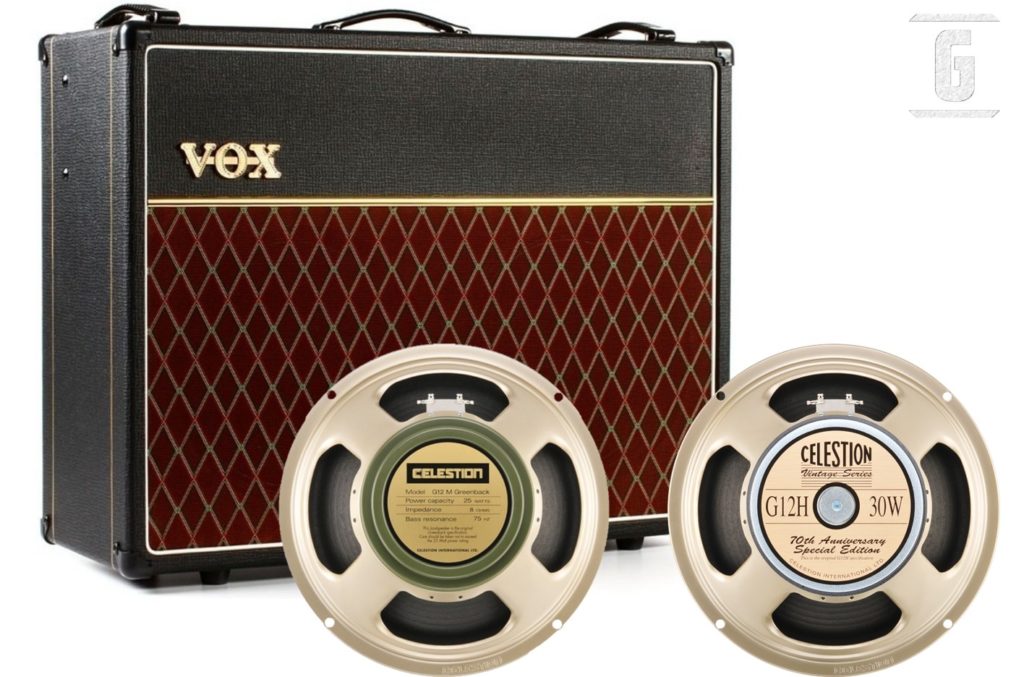
What’s missing or extra from your current speaker or speaker?
You should think about what your speaker is missing or excess, although, unless it is a known model, you will not know the characteristics of the speaker to be able to compare with another, but it will give you a reference of what you are looking for.
For example, it may happen that your equipment has a lot of highs and you want to balance it, so you can use a Greenback G12M to round out those high frequencies. On the contrary, it may happen that you want your amplifier to define a little more, in that case, G12H30s can give you some extra treble that will give more brightness and definition.
Combination between speaker and amplifier
As we already said, everything we have seen is a reference, but there are no rules other than the techniques to follow, so, you can see that many guitarists and even manufacturers, combine American type equipment with British speakers to “hotrode” them and make them perform. best for saturated audios, of course, you sacrifice clean audio a bit.
The Celestion Vintage 30, G12H30 and V-Type are widely used for hotroding Fender-type amps.
4×12 or 2×12 cabinets and guitar speaker combo
The interesting thing about cabinets is that you can use 2 or 4 speakers of the same brand or model or combine them. Thus, there is a very used combination that is the Celestion Vintage 30 with G12H75. These seconds have more scooped frequencies and the V30s are well focused on mids, thus giving a well-used and balanced audio.
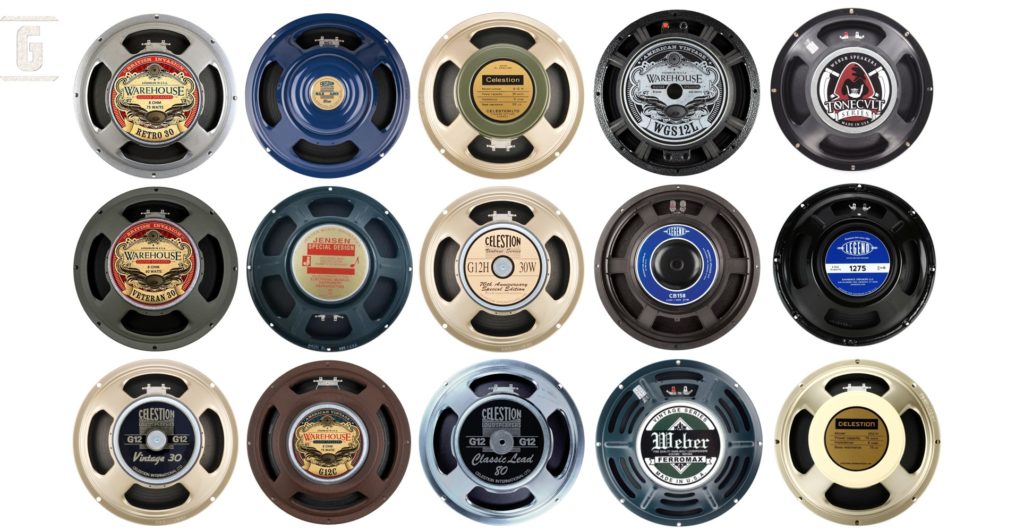
Use your ear: try many guitar speakers
Choosing the right guitar speaker or speaker really comes down to using your ear. It is important that at the end of the day, you let your ear of the verdict, do not be afraid of being wrong. Not always what works for others will work for you. So try and test as many speakers as you can, so you can find the right speaker for you.
Related Articles: Top 9 tips to improve your tone with your amp.
For more information and other tips, head over to Guitar Quarter.
You can share opinions or also chat about this and more with other musicians in our comments section.






